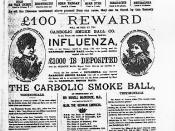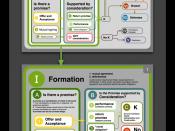1. What are the four elements of a valid contract?
Indeed there are four elements of a contract;
A. Agreement
B. Consideration
C. Contractual capacity
D. Lawful object
2. Describe the objective theory of contracts. How does that theory apply to this case?
We currently use contract law based on the objective theory of contracts. This states
that if an objective third party (the jury) believes the parties intend to form a contract, then a
contract should be found, meaning we prefer to interpret actions and words in such a way
that a contract exists rather than to interpret them to find there is no contract.
(www.buiznt.cob.calpoly.edu).
This theory does apply to this case. There is 2 ways to perceive this case, the first is the
way that John Leonard did. He believed that the harrier jet was one of the prizes he could
receive if he met all the obligations.
Pepsi Co. stated that it was just a humorous act and
assumed that everyone would laugh and not take it seriously. When Leonard took this case
to court, the federal judge held the responsibility of the reasonable person, because the article
did not specify that there was a jury. He looked at the ad and agreed with Pepsi Co. There
was not intent to mislead. The judge used his common sense and considered that, who would
really offer a 23 million dollar jet to give away, and further more, no objective person could
reasonably believe that they were offering the Harrier jet to consumers.
3. Why do you think the court held that there was not a valid agreement here?
There was no formal agreement made, any reasonable level-headed person would
understand that they were indeed joking and the judge also saw the humor in the Harrior jet
offer. The judge determined that "an advertisement is not transformed into an enforceable
offer merely by a potential offeree's expression of willingness to accept the offer".
(www.scu.edu). Just because Leonard sent in $700,000 dollars, does not justify him
accepting a contract because there was no contract. The judge also stated that there was fine
print that said "not available in all areas". He concluded that no reasonable person would
agree of Leonard's analysis of the advertisement.
4. Are advertisements generally considered offers? Why or why not?
An advertisement is not generally considered an offer. It is defined as an invitation to
make an offer. The rule is to protect advertisers and sellers from a breach of contract suit in
the event that they ran out of goods. There is one exception to the rule, an advertisement is
considered an offer if it is so definite or specific that it is apparent that the advertiser has the
present intent to bind himself to the terms of the advertisement. (Henry R. Cheeseman, 4th
Edition).
5. How does this case differ from a reward situation, where a unilateral contract is formed upon completion of the requested act?
This case differs from a reward situation because there was no reward offered by Pepsi
Co. at any time. It was simply and advertisement. A reward is an offer to form a unilateral
contract. This means that if you do what I ask for the said amount, then you will receive the
said amount. In other words, say I lost my dog and posted signs up saying that I lost him and
left my phone number and address to return him if you find him. I got no response from this,
so I went out and put some more signs up offering a $500 dollar reward for the return of my
dog in hopes to get some people to actually look for him. Then I get a call from somebody
saying that they found my dog, they saw a poster with my phone number on it, so they called
it. I would not have to pay the reward to this person because they never saw the reward
poster, they just saw the first one I put up and called me. To collect a reward, you must first,
have knowledge of the offer, and second, complete the task that I have asked. If you have no
knowledge of the reward, then you are not entitled to it. (Henry R. Cheeseman, 4th Edition).


